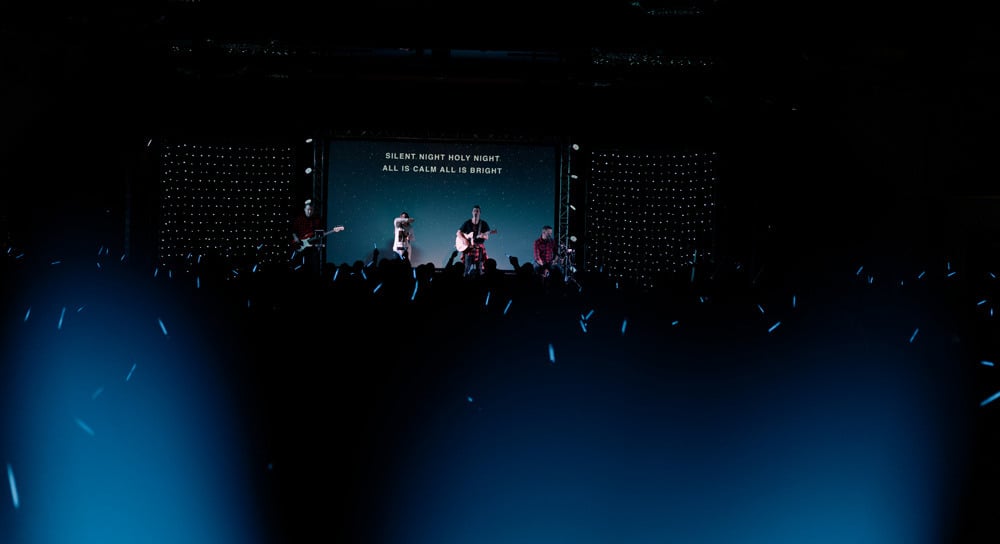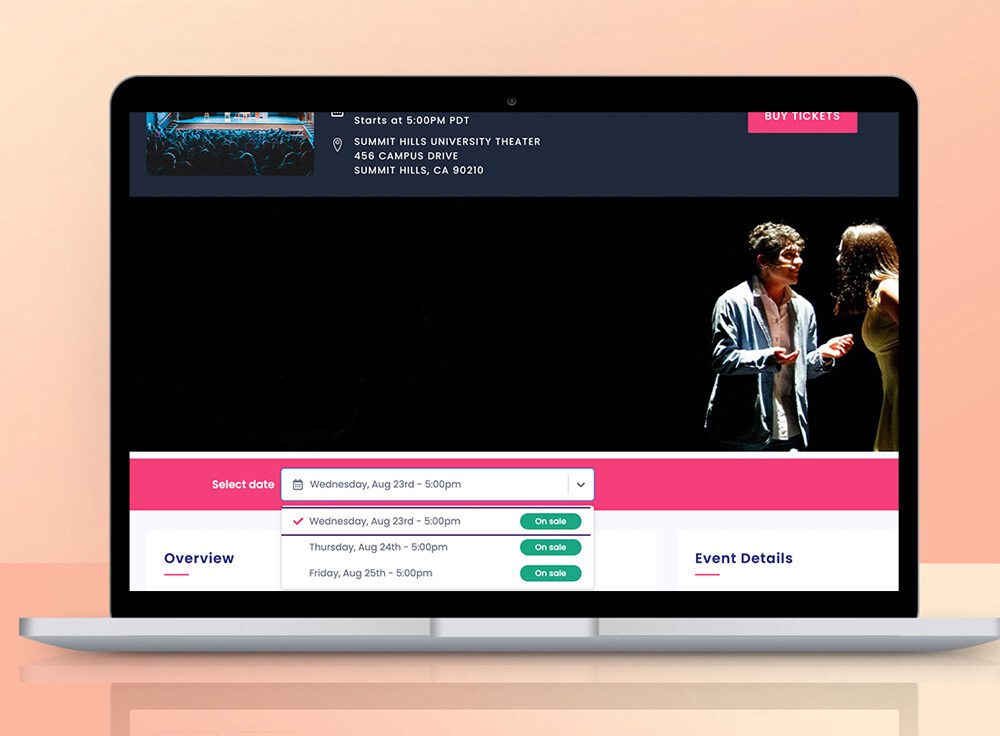How to Plan a Successful Concert Series: A Guide for Event Planners
A concert series is a fantastic way to create an ongoing relationship with your audience while bringing in consistent revenue for your event or organization. Unlike a one-time event, a concert series spans multiple dates, featuring different artists or performances around a unified theme. Whether you're organizing a summer music festival that runs every weekend or a year-long classical performance series, planning a concert series requires foresight, detailed coordination, and strategic marketing.
This blog will guide you through what a concert series entails, what you should consider during the planning process, how to handle logistics, and best practices for ticketing.
What is a Concert Series?
A concert series consists of multiple musical performances, often held over a set period, that are connected by a common theme, genre, or location. These events can take place weekly, monthly, or even across a season, providing attendees with a recurring entertainment experience.
Concert series can range in size and scope:
- Local and community-based series: Often smaller in scale, featuring local artists or genres specific to the region.
- Genre-specific series: Focused on a particular style of music (e.g., jazz, classical, or indie rock) to attract a niche audience.
- Seasonal concert series: Festivals or themed events that run throughout a specific season like summer or fall.
- Benefit concert series: Centered around a cause, raising funds and awareness for charities or nonprofit organizations.
- Mixed-genre festivals: These often include a diverse lineup of artists and genres, aiming to attract a broad audience.

Key Considerations When Planning a Concert Series
Planning a concert series requires more than just booking talent and selling tickets. Several critical factors need to be addressed to ensure success.
1. Concept and Theme
Establishing a concept or theme for your concert series is one of the first steps. It sets the tone and gives your audience a reason to attend multiple shows, not just one. Themes can be built around specific genres, community engagement (e.g., a local talent showcase), or even historical and cultural relevance (e.g., a classical music series featuring composers from different eras).
Questions to ask:
- What will make this concert series unique or memorable?
- How does it cater to your target demographic?
- Will the series feature a recurring theme, or will each concert have its own focus?
2. Budget and Financial Planning
Concert series can be more costly to plan than single-day events due to their extended nature, so it's important to create a detailed budget. Consider all the factors: artist fees, venue rental, stage production, marketing, staffing, and more.
Key tips for budgeting:
- Spread out costs over time, as revenue will also trickle in from ongoing ticket sales.
- Consider cost-sharing opportunities with sponsors or partners.
- Offer discounted series passes to increase attendance across multiple events.
- Secure insurance for all performances in case of cancellation due to weather or other unforeseen circumstances.
3. Venue Logistics and Setup
Venue selection is crucial in creating the right atmosphere for your concert series. Whether your series is hosted indoors at a concert hall or outdoors in a park, you need to ensure the venue can support the technical needs of multiple performances over time.
Key considerations for venues:
- Capacity: Can the venue accommodate the expected number of attendees? Will it feel too big or too small based on ticket sales forecasts?
- Acoustics: Different venues have varying sound properties, so ensure the acoustics are suitable for your genre of music.
- Flexibility: Is the venue available for all dates? Can it handle the setup and teardown needed for multiple concerts?
-
Weather and Backup Plans: For outdoor concert series, ensure there are contingency plans for poor weather, such as tent rentals or nearby indoor alternatives.
4. Artist Selection and Booking
The success of your concert series largely depends on the talent you bring in. When booking artists, consider both their popularity and how well they fit into the overall theme or vibe of your series.
Things to keep in mind:
- Diversity in Lineup: If you have a recurring audience, keep things fresh by offering variety in performances, even within a single genre.
- Contracts: Have clear contracts outlining the terms, payment schedules, cancellation policies, and other responsibilities of both parties.
-
Scheduling: Ensure that artist availability aligns with your planned series dates. Build in buffer time for sound checks and rehearsals to avoid delays.
5. Marketing and Promotion
The success of your concert series will hinge on a well-coordinated marketing campaign that spans the length of the series. Because these events are spread out over time, sustained marketing efforts are essential to keep your audience engaged and excited.
Marketing strategies to consider:
- Pre-launch buzz: Build anticipation with teaser campaigns, sneak peeks at your lineup, or early-bird pricing for tickets.
- Ongoing engagement: Use social media, email newsletters, and your ticketing platform to keep your audience informed about upcoming shows, artist profiles, and exclusive content.
- Collaborations and Partnerships: Partner with local businesses, influencers, and media outlets to promote the series. Cross-promotions can help extend your reach.
-
Ticket bundles and season passes: Offer incentives for attending multiple events, such as discounts or VIP perks, when attendees buy a series pass.
6. Ticketing and Audience Management
Ticketing for a concert series requires careful planning, especially if you’re offering multi-event passes or early-bird specials. A good ticketing platform can simplify this process and create a seamless experience for your attendees.
Best practices for ticketing:
- Early-bird and tiered pricing: Offer discounted rates for early purchases and tier ticket prices based on seating sections, demand, or access to VIP areas.
- Series passes: Allow customers to buy passes for the entire series, giving them the convenience of one purchase and potentially increasing your overall revenue.
- Flexible ticket options: Provide flexible ticketing options that allow customers to attend individual concerts or the entire series, depending on their preferences.
- Assigned seating: If your concert series takes place in a venue with seating, consider using a ticketing platform that offers assigned seating to enhance the customer experience.
- Group discounts: Encourage larger sales by offering discounts for group purchases, which can help boost attendance and community engagement.

7. Staffing and Volunteer Coordination
A concert series can be labor-intensive, so be prepared to coordinate a team that can help with event setup, ticketing, artist management, and customer service.
Key roles to consider:
- Event coordinators: Ensure each concert runs smoothly from start to finish, handling everything from sound checks to managing artists’ schedules.
- Front-of-house staff: Ticket scanners, ushers, and merchandise sellers will help create a seamless experience for attendees.
-
Volunteer opportunities: For community-based or nonprofit concert series, using volunteers can save costs while engaging your local audience.
8. Onsite Coordination and Execution
Once the series begins, your role as an event planner will shift to coordination and execution. The logistics for each concert need to be finely tuned to ensure a smooth experience for both artists and attendees.
Best practices for onsite execution:
- Load-in and load-out schedules: Ensure that there’s enough time between performances for sound checks, rehearsals, and setup changes.
- Artist hospitality: Manage backstage operations, ensuring that artists have what they need (refreshments, dressing rooms, etc.) and are briefed on the event flow.
- Technical support: Have a skilled tech crew on hand to manage sound, lighting, and other AV requirements for each show.
- Security and safety: Make sure your security team is prepared to handle crowd management and ensure that emergency plans are in place.
|
Request your venue seating map We build an unlimited amount of maps for |
Conclusion
Planning and executing a concert series is a challenging yet rewarding experience for event planners. The key to success lies in detailed planning, consistent marketing, and seamless coordination across multiple performances. By considering the factors outlined in this guide—such as theme, budget, venue, ticketing, and artist selection—you'll be well on your way to producing a memorable concert series that keeps audiences coming back for more.
Remember, the foundation of a great concert series is an unforgettable experience. With the right planning, your event can grow in popularity, creating long-term engagement with your audience and becoming a staple in your community or industry.







